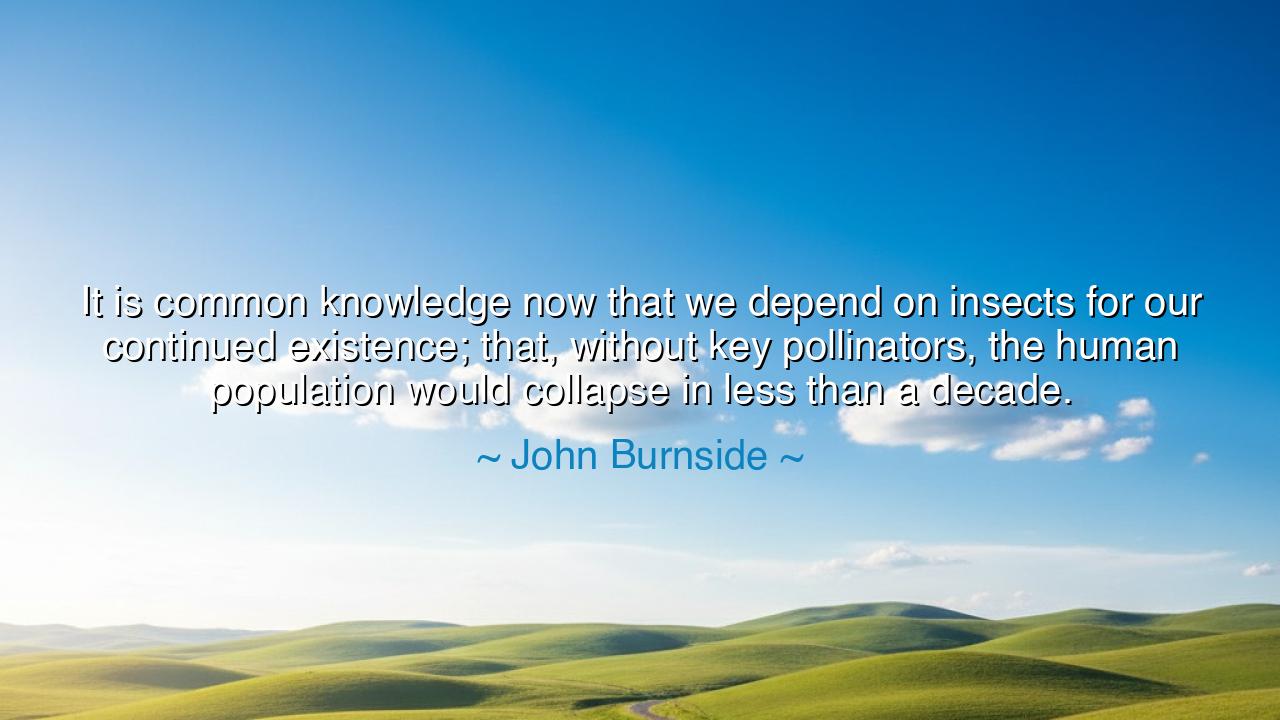
It is common knowledge now that we depend on insects for our
It is common knowledge now that we depend on insects for our continued existence; that, without key pollinators, the human population would collapse in less than a decade.






The words of John Burnside — “It is common knowledge now that we depend on insects for our continued existence; that, without key pollinators, the human population would collapse in less than a decade” — ring like both a revelation and a warning. In these words lies not only the voice of a poet and naturalist, but the voice of the Earth itself, crying out through the fragile wings of bees and butterflies. Burnside reminds us that life — vast, complex, and seemingly indestructible — rests upon the smallest of creatures. His wisdom echoes the philosophy of the ancients, who saw the universe as an interwoven web, where even the humblest being holds the thread that sustains creation. To forget this truth is to court ruin; to remember it is to walk once more in harmony with the rhythm of life.
The origin of this truth lies in nature’s eternal design. For millions of years before humankind walked the earth, the insects were already its caretakers — pollinating flowers, spreading seeds, sustaining forests, and feeding birds and beasts alike. When Burnside speaks of “key pollinators,” he speaks of the bee, the butterfly, the beetle, and the moth — unseen laborers whose devotion feeds the world. Nearly one-third of all food consumed by humans depends on these tireless creatures. Without them, the orchards would wither, the fields would fail, and famine would stalk the nations. Yet in our arrogance, we have forgotten this sacred partnership. Pesticides, pollution, and the relentless hunger of industry have turned our benefactors into casualties, and the hum of the bee — once the music of creation — grows fainter with every passing season.
This understanding is not new, though it feels newly urgent. The ancients, who lived closer to the soil, revered the insect as a symbol of persistence and divinity. The Egyptians saw the scarab beetle as the emblem of the sun’s rebirth; the Greeks honored the bee as the messenger of Artemis, goddess of wild things. They knew what modern man has forgotten — that power lies not in domination, but in symbiosis. Burnside’s words call us back to that older wisdom, to see again the sacred interdependence that binds all life. For in nature, there is no hierarchy, only harmony; no supremacy, only balance. When the smallest falters, the greatest must fall.
History itself offers witness to this truth. In the mid-20th century, the province of Sichuan in China suffered a tragedy born of ignorance. In an effort to protect crops, the government ordered the mass extermination of sparrows and insects, believing them to be pests. Yet when the pollinators and seed-spreaders were gone, the orchards turned to dust and the fields to silence. For years, men and women were forced to climb trees and pollinate blossoms by hand, thousands of lives spent in toil to replace what nature once gave freely. The lesson was bitter but clear: the web of life cannot be severed without consequence, for all living things are bound by invisible threads of need and nourishment.
When Burnside warns that “the human population would collapse in less than a decade,” he is not dealing in metaphor, but in prophecy. He speaks to a world intoxicated by convenience, deaf to the whisper of the soil. We live in the illusion that technology can replace nature — that if the bees perish, we can invent machines to do their work. But no machine can replace the grace of the pollinator, no circuit can replicate the complexity of the living web. Insects are not expendable; they are essential. The life of the planet depends upon their survival — and thus, so does ours.
Yet within this dire warning lies the possibility of redemption. Humanity still holds the power to restore what has been broken. By protecting habitats, reducing toxins, and planting the flowers that feed the pollinators, we honor the ancient covenant between man and nature. The call is not only for scientists and governments, but for every soul that walks the earth. For as the poet reminds us, the act of care — planting a seed, sparing a bee, tending a garden — is not small. It is sacred. It is the rekindling of harmony between the human spirit and the natural world.
The lesson of Burnside’s words is simple yet profound: humility before creation. The measure of our civilization is not found in our cities or machines, but in how we treat the smallest lives among us. The bee in the field, the moth at dusk, the ant upon the earth — they are the quiet architects of the world’s abundance. If we destroy them, we destroy ourselves. If we protect them, we preserve the legacy of life itself.
Therefore, let these words be remembered as both a warning and a vow: to cherish the living threads of nature as our ancestors once did; to restore the gardens we have trampled; to listen once more to the song of the bees, and in their hum, hear the heartbeat of creation. For as John Burnside reminds us, the world does not belong to man alone — it is a shared miracle, and its smallest keepers are its greatest guardians.






AAdministratorAdministrator
Welcome, honored guests. Please leave a comment, we will respond soon